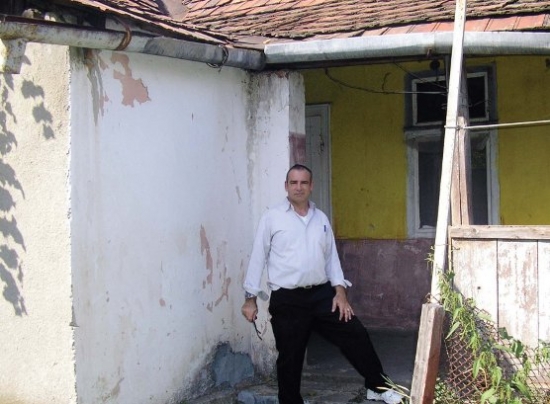
Great-Grandfather's house.
It all started a few years ago after I visited Poland with my son’s class; it continued with tape recording my cousin's account of some of his Holocaust experiences, and was enhanced by the bond forged between my family and our European cousins.
On a deeper level it started long before, on the day of my brit milah when I was named for my great grandfather, Mordecai Markowitz. And it was spurred by the twenty years of my childhood and youth when I was lucky enough to grow up in the loving presence of my grandfather Eugene, Mordecai's son, who instilled in me the strong Jewish identity that has shaped so much of who I am.
The start was promising but the continuation foundered. I was all talk but no action. My desire to find and visit Grandfather Mordecai's grave was a dream I talked about, but no more. It was easy to rationalize inaction: I didn't know where he was buried; even if I found the town, who knew if the Jewish cemetery there still existed and if so, if the gravestone could be identified?
The initial lead came in early 2004 when my father and his wife, my wife, Jeri, and I visited Salzburg where we first met our cousins. They told us that Mordecai lived in Batyu, a small village near the town of Munkasch.
But still I did nothing, until one day a few months ago when I mentioned to my friend and office manager that I would like to find the burial place of my great-grandfather. Her response was: "You told me that a few years ago!"
The (justified) verbal slap in the face finally spurred me into action. Through the internet, I made contact with Rabbi Arye Linker of the Rabbinical Center of Europe (RCE). Rabbi Linker, a former American who (like myself) has lived in Israel for many years, heads up the division of RCE which works to preserve Jewish cemeteries in Europe. Rabbi Linker told me of a Chabad Rabbi, Menachem Mendel Taichman, who lives in Uzhgorod (formerly Ungvar), a town in the Carpathian Ukraine. He also mentioned that on September 7 there was to be a memorial service for Jews killed in the Holocaust and buried in a mass grave in Uzhgorod, recently found by Rabbi Taichman. Unknown as yet to me, the stage was already set for my trip.
I contacted Rabbi Taichman, who was more than cooperative. He told me that to his knowledge Batyu has no existing Jewish community and that he was not certain as to the state of the Jewish cemetery there. Rabbi Taichman agreed to travel there on my behalf and find out. And he did just that.
On a Friday morning in mid-August I received an email from Rabbi Taichman announcing that he had found the cemetery in Batyu – in fact, he wrote, he remembered visiting there a few years earlier on behalf of an American family who then gave a certain sum of money which enabled the Rabbi to build a fence around the cemetery.
Luckily, he wrote, the entrance to the cemetery was locked, which required him to enter through the back, by way of the property of a cooperative neighbor. Starting in the back of the cemetery, he examined each gravestone – and the fifth one he saw was that of Grandfather Mordecai!
I had given the Rabbi the name of Mordecai's father, Ya'akov Zvi, and also sent him the acrostic that was written on Mordecai's gravestone. The Rabbi in his letter specifically mentioned finding on the gravestone "Mordecai ben Ya'akov Zvi"; he did not mention seeing the last name and made only an oblique reference to additional words on the stone. Perhaps the tall weeds made it difficult to see what was written, perhaps erosion on the stone itself obliterated the writing after so many years. Also, as Rabbi Taichman noted, how many "Mordecai ben Ya'akov Zvi's" could there be in a small place such as Batyu?
I agree, though in my heart I wondered how I would feel if I got there and there was no acrostic; or worse still, if by the date of death it would be clear that this was not the grave of my great-grandfather (who I knew died shortly before the Nazis entered Hungary)?
Before I left Israel, at the suggestion of Eli, barber, a wise and pious Jew, I had a stone engraved with the following words:
"To Grandfather Mordecai, Who gave us life
From Shlomo Yerachmiel, his son Mordecai and their families. Elul, 5769"
I took the stone with me, hoping to attach it to Mordecai's gravestone.
Friday September 4: from Israel to Uzhgorod
I left Israel on a flight to Budapest with a continuing flight to Uzhgorod. Before leaving Israel, it was clear to me that Uzhgorod (and the whole Carpathian region) was off the beaten track as far as tourism goes. One flight a day from Kiev, two flights a week from Budapest. Budapest, the nearest major city, is 400 kilometers away. The entire area is part of the Ukraine today.
The flight to Uzhgorod was what I imagined: a propeller plane with only five passengers. At the airport there were more officials to greet us than passengers. Within half an hour, I was free to begin my journey in Uzhgorod. The taxi took me to my hotel, Hotel Uzhgorod, which was a pleasant surprise: modern, clean and nice, the only place in town where people spoke English.
It was late Friday afternoon when I got to the hotel and I was pressed for time. Shabbat was coming in soon and before anything else I had to get the Glatt kosher fresh meat I had brought at Rabbi Taichman's request, to his house. By taxi it was only a few minutes (and some hand signals) to the house and soon I was back at the hotel to have a short rest before Shabbat festivities began.
The Rabbi and his wife invited me to their house for a "small" meal before Shabbat. Shortly afterwards I accompanied the Rabbi to the synagogue, a short walk from his house.
After services we returned to the Rabbi's house for dinner. The Rabbi and his wife (both Israelis) and their five children are obviously used to guests.
For me, it was a chance to experience a world that is close to my heart but far removed from my secular, cynical milieu. I highly recommend this spiritual therapy. But above all was my feeling of indebtedness to a rabbi who only for the sake of doing a mitzvah for a fellow Jew, brought me closer to touching my family roots in a place where Judaism flourished but is no more.
Saturday September 5: Uzhgorod
This Shabbat was peaceful and very "Shabbisdik": morning services; another Shabbat meal at the Rabbi's house with more singing and even dancing; a rest before Mincha; more eating ("Shalashudis") and concluding with Ma'ariv and Havdalah. The irony of such strict observance in such "Goyish" surroundings did not escape my attention.
Sunday September 6: Batyu
This was to be the big day: I was going to Batyu! Joined by Rabbi Taichman and one of his local assistants and their two young sons, we set out. Batyu is some 40 kilometers from Uzhgorod, close to the Hungarian border. I was happy that the Rabbi was going with me. He hadn't promised to come – he was busy with the preparations for the events scheduled to take place the next day – but in the end he was able to join me.
Once we arrived things happened quickly – and dramatically. We saw an elderly woman sitting outside her house and, on a whim, I asked the Rabbi to ask her in Russian if she remembered my greatgrandfather. Markowitz? Yes, she remembered. (Apparently there were only about thirty Jewish families that lived in Batyu before the Holocaust). She said that he sold newspapers and magazines from his house. Is the house still standing, we asked? Yes – and she agreed to take me to it. In a few minutes I found myself standing in front of the house where Mordecai had lived 70 and more years ago. How could I be sure that the woman was telling the truth? I couldn't be totally sure but it sounded plausible: she said that she was 78 years old, which meant that she was a young girl when Mordecai was still alive; it was a small village and it seemed reasonable that everybody knew each other. Later, when back in Israel, in a telephone conversation with my cousin he confirmed that Mordecai did indeed sell newspapers and magazines.
Finding the house was an unexpected bonus but the real emotional high point was soon to come, at the cemetery. The Jewish cemetery is located right in the village, between two houses. The area is fenced in (courtesy of the American family who visited a few years earlier). The cemetery is quite small, about 100 standing gravestones. A local neighbor whom the Rabbi engaged on my behalf to cut down the dense weeds covering the cemetery and many of the gravestones, did his job well.
As I approached Mordecai's gravestone my heart began to pound. When I reached it all doubt about this being the true burial place of my great-grandfather immediately dissolved: not only did the stone show the names of Mordecai and his father but also his last name – Markowitz – and in addition, the acrostic that my cousin had remembered, word for word! The words on the stone – all in Hebrew – also said that Mordecai died in old age ("besaivah tova") and stated the date of his death: 17 Iyar 5702 (May 4, 1942).
The feeling of relief at knowing that I had found the grave quickly made way for the emotion swelling up inside me. As I read from the book of Psalms, the tears began to flow. At that moment I had no doubt that what Rabbi Taichman said was true: that God was with me in Batyu, that He wanted me to be there. I believed then and still believe, that Mordecai himself, my grandfather Eugene, my father, my cousin and also those of Mordecai's children and grandchildren who lived near him and survived him, only to be killed shortly thereafter in the Holocaust – were all there with me that day in Batyu. I thought about it at the time: 67 years had passed since Mordecai's death; during nearly all of those years no one could come to visit his grave. Until now.
After reading from Psalms we attached the memorial plaque I had brought with me to the gravestone to the side with no engravings so as not to take away from the original words. The visit would not have been complete without picture-taking. Tangible proof that I was there.
Reluctantly, I left Batyu. Really, I had nothing more to do there, no more people to talk to and I had found what I had come for, and more. What I didn't want to part with, perhaps, was the physical connection with my grandfather Eugene's past. A past which, to my regret, I had never asked him about. But I know that his soul was looking down and smiling at me, in Batyu.
Monday September 7: Munkasch and Uzhgorod
I planned my trip to Batyu to coincide with a memorial service organized by Rabbi Taichman to honor the memory of some 200 Jews who died during the Nazi occupation and are buried in a mass grave in the Jewish cemetery in Uzhgorod. It was clearly important to the Rabbi that as many people as possible be present – he specifically asked me to be there – and I was happy to honor his request.
After three and a half emotion-packed days, my visit to the Carpathians was over. It was a trip unlike all other trips of mine. A journey to a place I never knew but to a past that has shaped my identity. As to the future, I believe that the journey and its impact will be with me for a long time to come. I am also determined not to let another 65 years pass before another Markowitz family member visits the grave of my great- grandfather.
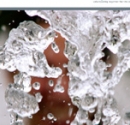 DEAR EDITOR 153
DEAR EDITOR 153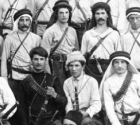 REVISITING THE PAST BETH HASHOMER
REVISITING THE PAST BETH HASHOMER BIBLICAL ZOOS & ANIMAL RESERVES IN ISRAEL
BIBLICAL ZOOS & ANIMAL RESERVES IN ISRAEL (302x450)-1451381711.jpg) Odeon Oscar
Odeon Oscar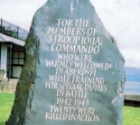 The Jewish Connection
The Jewish Connection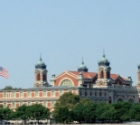 ellis island
ellis island